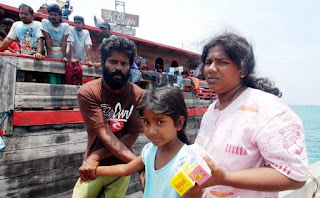
(AFP) – 2 hours ago
JAKARTA — The leaders of Indonesia and Australia agreed Tuesday to come up with a joint plan to tackle a rash of asylum seekers taking the treacherous boat journey to Australia, an official said.
Indonesian President Susilo Bambang Yudhoyono and Australia Prime Minister Kevin Rudd agreed during talks in Jakarta to meetings to come up with a "framework" to deal with the migrants, Indonesian presidential spokesman Dino Patti Djalal told reporters.
"We don't want to deal with this on an ad hoc basis, so very soon there will be a meeting between navy, immigration and police personnel from both countries to meet and formulate this framework," he said.
"The result of the recommendation will be reported to the two leaders."
Djalal said Indonesia had also agreed to accept temporarily a group of "around 75" suspected asylum seekers intercepted at the weekend by the Australian navy in the waters between the two countries.
"For humanitarian reasons the ship will be able to come ashore at (the western Javanese port of) Merak. There is a sick child on board and there are other people who are suffering," he said.
"We will temporarily accommodate them in our territory."
Indonesia will formally request the United Nations High Commissioner for Refugees (UNHCR) to process the claims of the asylum seekers, as well as a group of 255 Sri Lankans who have refused to disembark from their wooden boat at Merak since last week, Djalal said.
A spokesman for the group of ethnic Tamils, who identified himself as Alex, told AFP the group would not go on to land until they were assured they will get a fair hearing for their requests for asylum.
"We have made a strong stance that we are going to stay on the boat until the UNHCR comes to visit us," he said by telephone.
The group had earlier threatened to set fire to their ship and had staged an abortive hunger strike.
A wanted alleged people smuggler, Abraham Lauhenaspessy, known as "Captain Bram," was arrested after being found on the boat picked up by Indonesian authorities last week.
JAKARTA — The leaders of Indonesia and Australia agreed Tuesday to come up with a joint plan to tackle a rash of asylum seekers taking the treacherous boat journey to Australia, an official said.
Indonesian President Susilo Bambang Yudhoyono and Australia Prime Minister Kevin Rudd agreed during talks in Jakarta to meetings to come up with a "framework" to deal with the migrants, Indonesian presidential spokesman Dino Patti Djalal told reporters.
"We don't want to deal with this on an ad hoc basis, so very soon there will be a meeting between navy, immigration and police personnel from both countries to meet and formulate this framework," he said.
"The result of the recommendation will be reported to the two leaders."
Djalal said Indonesia had also agreed to accept temporarily a group of "around 75" suspected asylum seekers intercepted at the weekend by the Australian navy in the waters between the two countries.
"For humanitarian reasons the ship will be able to come ashore at (the western Javanese port of) Merak. There is a sick child on board and there are other people who are suffering," he said.
"We will temporarily accommodate them in our territory."
Indonesia will formally request the United Nations High Commissioner for Refugees (UNHCR) to process the claims of the asylum seekers, as well as a group of 255 Sri Lankans who have refused to disembark from their wooden boat at Merak since last week, Djalal said.
A spokesman for the group of ethnic Tamils, who identified himself as Alex, told AFP the group would not go on to land until they were assured they will get a fair hearing for their requests for asylum.
"We have made a strong stance that we are going to stay on the boat until the UNHCR comes to visit us," he said by telephone.
The group had earlier threatened to set fire to their ship and had staged an abortive hunger strike.
A wanted alleged people smuggler, Abraham Lauhenaspessy, known as "Captain Bram," was arrested after being found on the boat picked up by Indonesian authorities last week.

No comments:
Post a Comment